外研高二选修6 Module 2 Fantasy Literature模块复习课件(69张)
文档属性
| 名称 | 外研高二选修6 Module 2 Fantasy Literature模块复习课件(69张) |
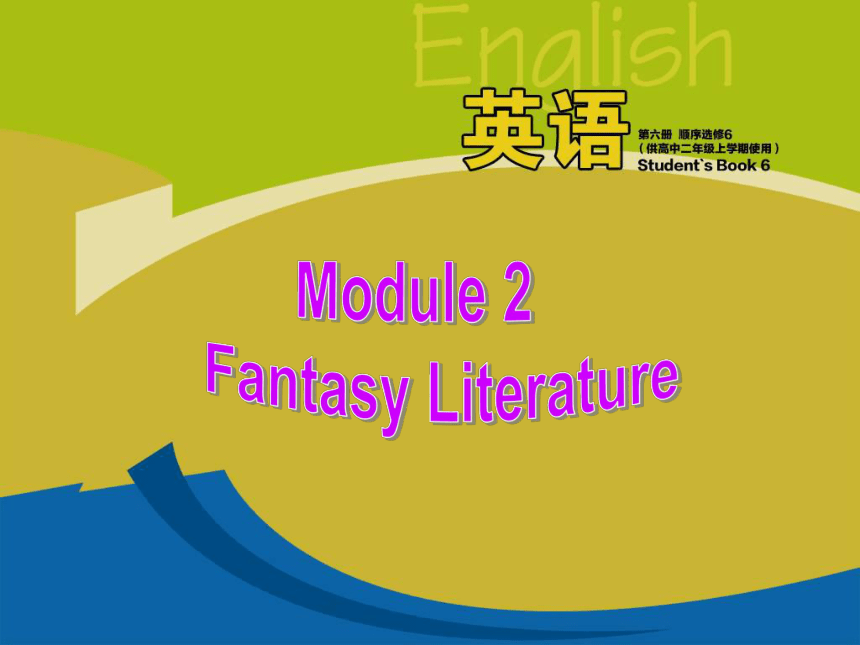
|
|
| 格式 | zip | ||
| 文件大小 | 426.7KB | ||
| 资源类型 | 教案 | ||
| 版本资源 | 外研版 | ||
| 科目 | 英语 | ||
| 更新时间 | 2017-01-18 00:00:00 | ||
图片预览



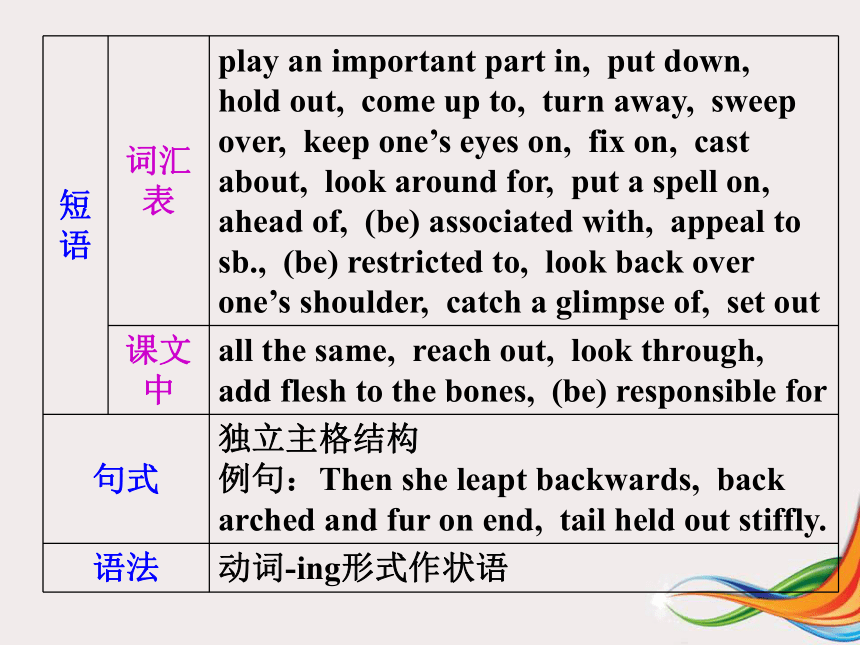
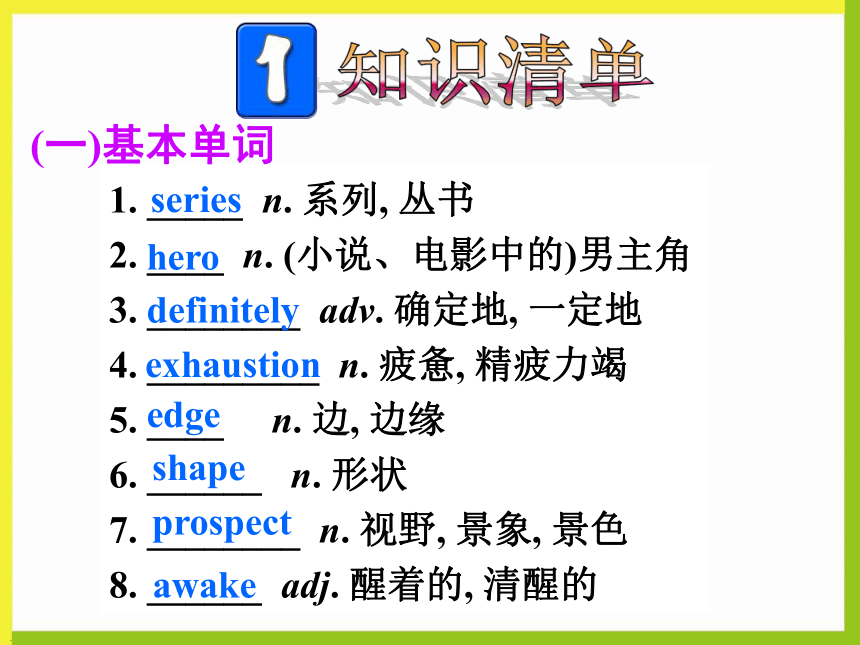
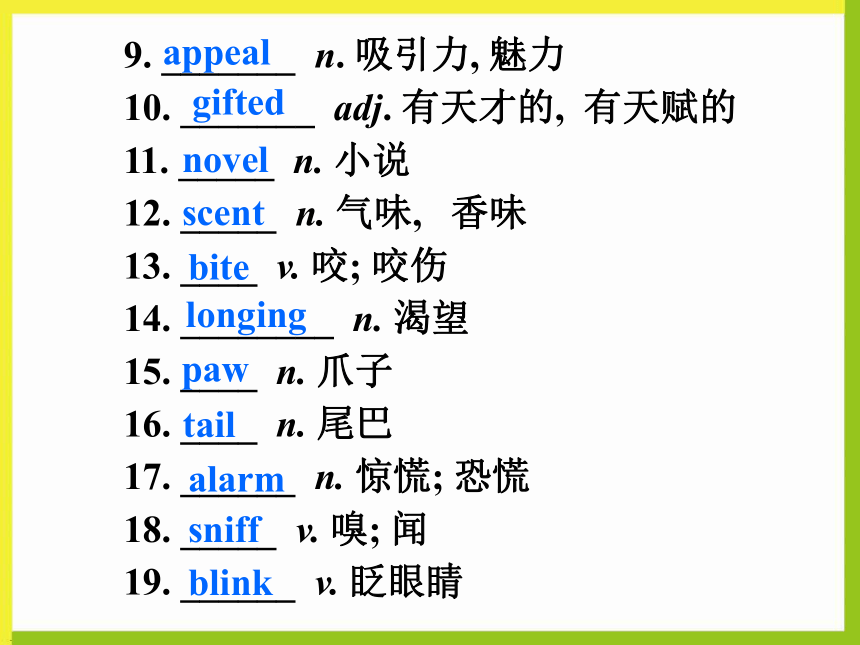
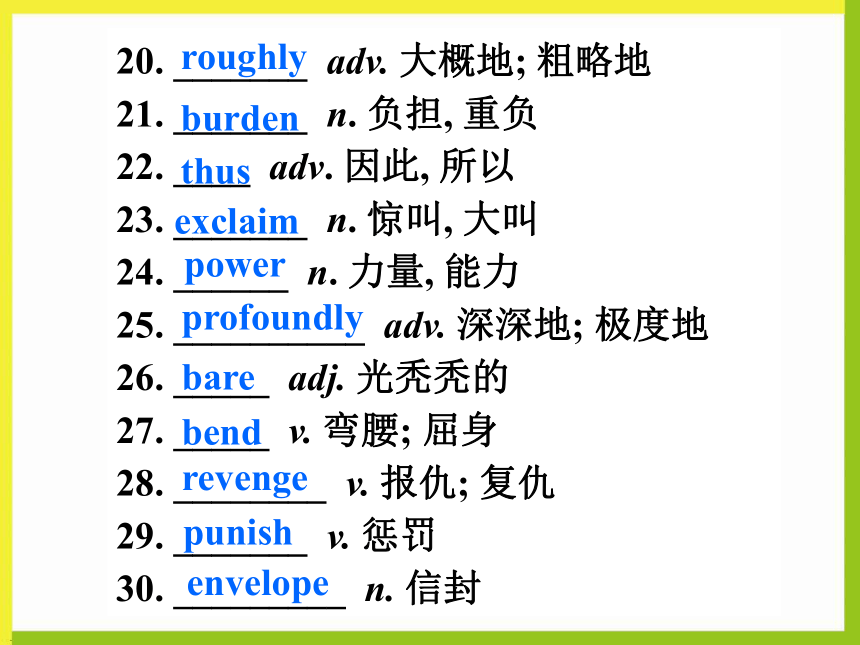
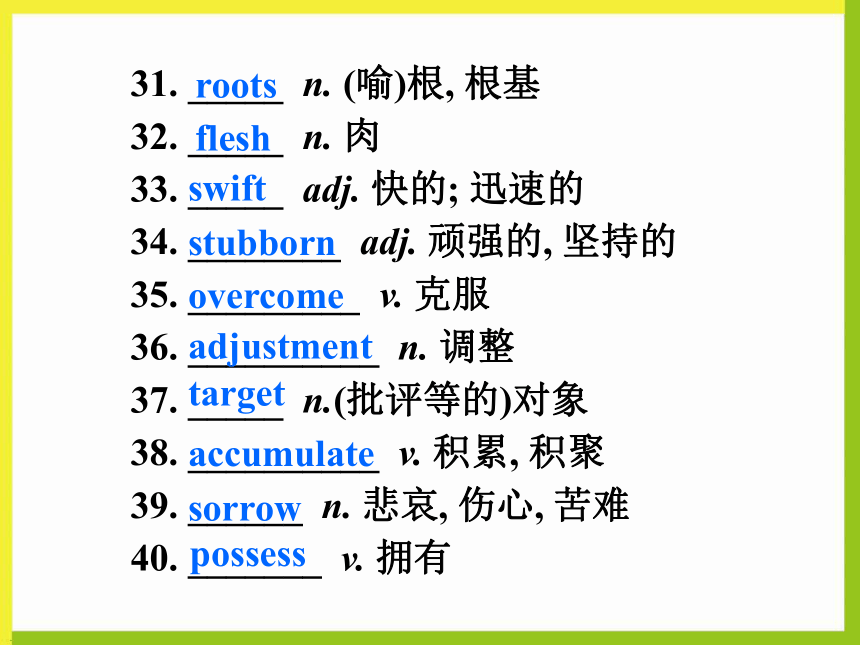
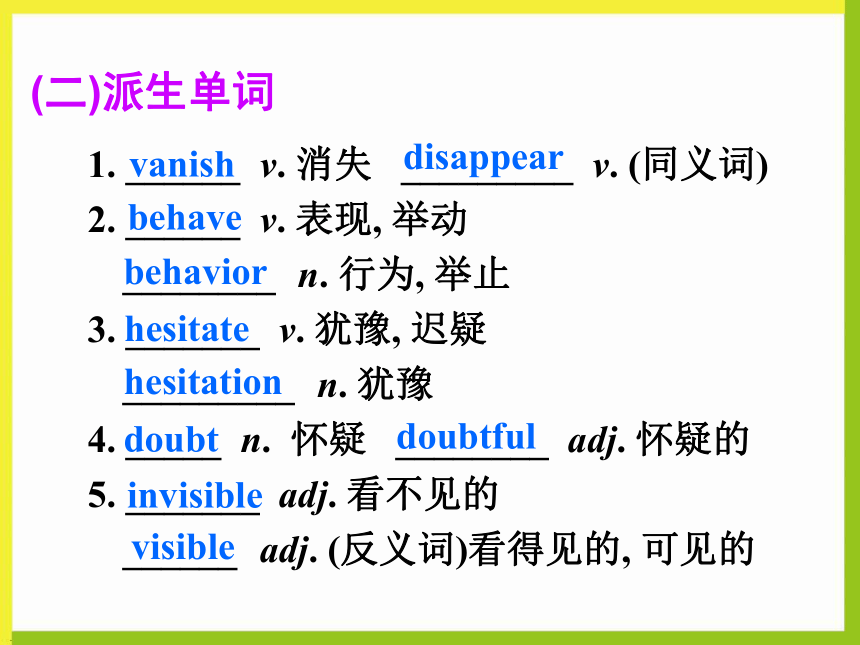
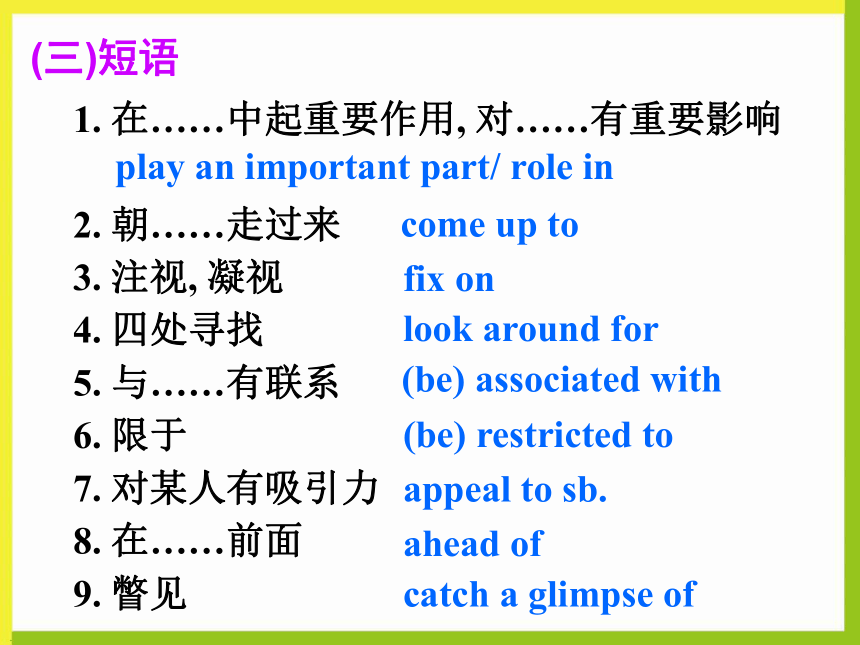

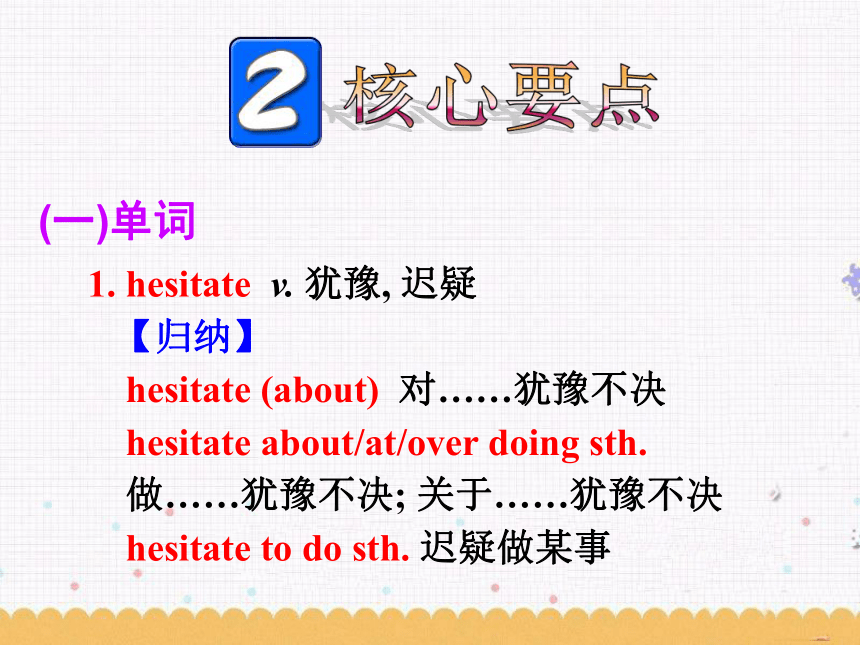
文档简介
课件69张PPT。Module 2
Fantasy Literature 知识归纳1. _____ n. 系列, 丛书
2. ____ n. (小说、电影中的)男主角
3. ________ adv. 确定地, 一定地
4. _________ n. 疲惫, 精疲力竭
5. ____ n. 边, 边缘
6. ______ n. 形状
7. ________ n. 视野, 景象, 景色
8. ______ adj. 醒着的, 清醒的知识清单(一)基本单词seriesherodefinitelyexhaustionedgeshapeprospectawake9. _______ n. 吸引力, 魅力
10. _______ adj. 有天才的, 有天赋的
11. _____ n. 小说
12. _____ n. 气味, 香味
13. ____ v. 咬; 咬伤
14. ________ n. 渴望
15. ____ n. 爪子
16. ____ n. 尾巴
17. ______ n. 惊慌; 恐慌
18. _____ v. 嗅; 闻
19. ______ v. 眨眼睛appealgiftednovelscentbitelongingpawtailalarmsniffblink20. _______ adv. 大概地; 粗略地
21. _______ n. 负担, 重负
22. ____ adv. 因此, 所以
23. _______ n. 惊叫, 大叫
24. ______ n. 力量, 能力
25. __________ adv. 深深地; 极度地
26. _____ adj. 光秃秃的
27. _____ v. 弯腰; 屈身
28. ________ v. 报仇; 复仇
29. _______ v. 惩罚
30. _________ n. 信封roughlyburdenthusexclaimpowerprofoundlybarebendrevengepunishenvelope31. _____ n. (喻)根, 根基
32. _____ n. 肉
33. _____ adj. 快的; 迅速的
34. ________ adj. 顽强的, 坚持的
35. _________ v. 克服
36. __________ n. 调整
37. _____ n.(批评等的)对象
38. __________ v. 积累, 积聚
39. ______ n. 悲哀, 伤心, 苦难
40. _______ v. 拥有rootsfleshswiftstubbornovercomeadjustmenttargetaccumulatesorrowpossess1. ______ v. 消失 _________ v. (同义词)
2. ______ v. 表现, 举动
________ n. 行为, 举止
3. _______ v. 犹豫, 迟疑
_________ n. 犹豫
4. _____ n. 怀疑 ________ adj. 怀疑的
5. _______ adj. 看不见的
______ adj. (反义词)看得见的, 可见的(二)派生单词vanishdisappearbehavebehaviorhesitate hesitation doubtdoubtfulinvisiblevisible1. 在……中起重要作用, 对……有重要影响
2. 朝……走过来
3. 注视, 凝视
4. 四处寻找
5. 与……有联系
6. 限于
7. 对某人有吸引力
8. 在……前面
9. 瞥见(三)短语play an important part/ role income up tofix onlook around for(be) associated with(be) restricted toappeal to sb.ahead ofcatch a glimpse of10. 出发
11. 伸出
12. 放下
13. 走开
14. 向……扩展
15. 寻找, 搜寻, 想办法
16. 注视, 盯着看
17. 充满的……(味道)
18. 回头看set outhold output ... downturn awaysweep overcast aboutkeep one’s eyes on(be) laden withlook back over one’s shoulder1. hesitate v. 犹豫, 迟疑
【归纳】
hesitate (about) 对……犹豫不决
hesitate about/at/over doing sth.
做……犹豫不决; 关于……犹豫不决
hesitate to do sth. 迟疑做某事(一)单词核心要点【拓展】
hesitation n. 犹豫; 踌躇; 迟疑; 不情愿
without hesitation
毫不犹豫地
have no hesitation in saying
毫不犹豫地说
2. marry v. 娶; 嫁; 结婚; 主持婚礼
【归纳】
marry sb. 嫁给/娶某人
marry A to B
把某人嫁给某人/让某人娶某人
【拓展】
marriage n. 结婚, 婚礼
by marriage 通过(借助于)婚姻
married adj. 已婚的, 结婚的辨析be married (to sb.)与get married (to sb.)
marry不可与with搭配, marry sb. “和某人结婚, 嫁给某人, 娶某人”。
be married与be married to sb. “和某人结婚”, 表状态, 可与表示一段时间的时间状语连用。
get married与get married to sb. “与某人结婚”, 强调动作, 不可与表示一段时间的时间状语连用。 3. possess
【拓展】
vt. 拥有, 持有(东西, 资产)
vt. 具有(性情, 特性)
被动语态表示“控制, 支配”
be possessed of
具有, 拥有(某种品质、能力等)
possession n. 拥有, 占有; 财产; 领土【归纳】
be in possession of= own
拥有, 在某人的控制下
be in the possession of = belong to
(某物)为(某人)所有/控制
take/ have possession of 占有……
e.g. She is possessed of a wonderfully
calm temperament.
The house is in the possession of my
uncle.4. distribute v. 分发, 分配; 分布; 分类
【归纳】
distribute sth. to/ among sb./ sth.
把某物分配给……; 分发给……
【拓展】
distribution n. 分发
distributor n. 分发者, 销售者, 批发商5. direction n. 方向
【归纳】
in the direction of 朝……方向
in all directions 向四面八方
under one’s direction 在某人的指导下
【拓展】
directions n. 指南; 说明; 地址
direct v. & adj. 管理; 指路; 直接的
directly adv. 直接地; 立刻 6. appeal n. 吸引力, 魅力, 上诉
v. 呼吁, 恳请; 吸引; 唤起; 上诉
【归纳】
appeal to sb. 对某人有吸引力
apple for sth. 呼吁某事; 请求给予
appeal to sb. for sth.
请求某人某事/为某事向某人提出呼吁
appeal to sb. to do sth.
呼吁/恳求某人做某事
make an appeal to sb. 向某人提出呼吁1. play an important part in
在……中起重要作用; 对……有重要影响
【拓展】
play a part/role 扮演一个角色
play a/ an... part/ role in
在……中担任角色; 起……作用
play the part of 扮演……的角色
play/ take an active part in
在……中起积极作用(二)短语2. keep one’s eyes on 注视, 盯着看; 注意
【拓展】
have an eye for 对某事物有鉴赏力或判断力
keep/ have an eye on sb./ sth.
关注, 照料某人/某物
keep an eye open for sb./ sth. 留心, 注意
fix one’s eyes on 凝视着看
catch one’s eye 引起某人注意
look sb. in the eye
(一般用于否定句) 直视, (正视)某人3. be associated with 与……有联系
【拓展】
associate sb./ sth. with
把某人/某物与……联系起来
associate with sb.
与人交往(尤指他人不赞同的)
in association with 与……合伙(合作)4. hold out 伸出; 持续; 抱有希望
【拓展】
hold back 阻止; 犹豫
hold down 压制; 抑制
hold on 抓牢; 坚持; 别挂(电话)
hold up 举起; 耽误
hold off(雨等)暂时不下, 推迟5. turn away 走开, 离开; 把……打发走;
拒绝给予同情(援助, 支持)
【拓展】
turn up 调大, 出现, 到达
turn down 调小/低, 拒绝
turn in 上交
turn out 结果是, 生产, 在场
turn over 翻转, 翻阅
by turns 轮流, 交替6. sweep over 向……扩展, 扩散
【拓展】
get over 克服, 恢复? ? ? ? ? ? ?
go over 复习, 仔细检查
look over 检查, 查看, 调查
knock over 撞倒??? ????????? ???
take over 接管?????? ???????????????
think over 仔细考虑
turn over? 翻过来, 仔细考虑????7. ahead of 早于, 领先, 比……高/ 强
【拓展】
ahead of time
提前, 提早?????
ahead of schedule
(比原计划或规定时间)提前I. 根据本模块所学单词及提示写出所缺单词的正确形式。
1. The new title was meant to give the party greater public ________ (吸引力).
2. When one gets old, one has a l________ for home.longingappeal? ?3. Buying a house often places a large financial b______ on young couples.
4. Simon decided to give away everything he ________ (拥有) and leave the country.
5. Eventually she managed to o________ her shyness in class.
6. The success of her book has given her unexpected celebrity ________ (地位).status? burden?possessedovercomeII. 用括号内单词的正确形式填空。
1. Retraining may seem like a kind of ___________ (punish) for some workers.
2. Would you like to experience a ________ (magic) world and make your dreams come true?
3. You should try to make some __________ (adjust) of your differences so that you can be more productive.adjustmentpunishment??magical????4. The old churches in this area are ________ (definite) worthy of being visited.
5. ?They were in a state of __________ (exhaust) after climbing the mountain.exhaustiondefinitelyIII. 选用方框内合适的短语并用其正确形式填空(每个短语限用一次)。appeal to, hold out, set out,
put down, sweep over1. People from all circles of society have ________ helping hands to the boy with cancer.held out? ? 2. Uncontrollable anger __________ Mr. Li when he learned his son was badly treated.
3. The book didn’t ________ children properly because the author employed too many scientific terms in it.
4. We ________ for the Western Hills at 10:30, only to see there were too many tourists.?
5. _________ these heavy bags for a minute and let’s have a rest.?Put downswept over?appeal to?set out ?1. Just behind him was that patch in the air.
就是在他身后空中有一块斑点。
倒装句, 为全部倒装。
采用全部倒装语序的句型有:
1) then位于句首, 谓语动词为come (follow) 时, 且主语为名词时。此时的一般时表进行。(三)句式 e.g. Then came a new difficulty.
2) there或now位句首, 谓语为come/ go时。
e.g. There goes the bell.
Now comes your turn.
3) here位于句首, 动词为be时。
e.g. Here are some picture-books.
温馨提示:当主语为代词时, 不用倒装。
e.g. Here/There he comes. 4) 方位副词 out, in, up, down, away, off, up等位于句首。
e.g. Up went the arrow into the air.
5) 句首状语为表示地点的介词短语时, 也常常引起全部倒装。
e.g. Behind him hung his photograph taken
in Mecca.2. Then she leapt backwards, back arched and fur on end; tail held out stiffly.
然后它向后一跃, 脊背拱起, 毛发竖立, 尾巴僵直地伸着。
独立主格结构:
独立主格结构的逻辑主语与主句的主语不一致, 它独立存在。在句中一般作状语, 表时间、条件、原因、伴随状况等, 该结构一般置于句首, 也可置句中或句尾, 一般用逗号与主句分开。常见的独立主格大体有以下几种:
1) 名词/代词+名词 (主要用以补充说明某一情况或表示某一方式)。 如:
I received many gifts, many of them were books.
2) 名词/代词+形容词/副词/介词短语。如:
The Trojans asleep, the Greek soldiers
crept out of the hollow wooden horse.
We fell asleep, all the lights on.
The boy went off, a pinwheel in his hand.3) 名词/代词+现在分词 (名词/代词与现在分词之间构成了逻辑上的主谓关系, 表正在进行的动作或状态)。如:
Weather permitting, we will go on our outing to the beach.
4) 名词/代词+过去分词 (名词/代词与过去分词构成了逻辑上的动宾关系, 表示已经完成的行为)。如:
All the windows cleaned, I had a good rest.5) 名词/代词+动词不定式 (表示还未发生的行为或状态, 在句中常作原因状语, 偶尔也作条件状语)。如:
Lots of homework to do, I have to stay home all day.3. A young man was walking through a wood when he saw a ring lying on the ground.
一个年轻人在穿过一片森林时, 忽然看到地上有一枚戒指。
when为并列连词, 连接两个句子, 为and then/ and at the time (moment)。
when的这种用法常用于以下句型:
...be doing...when 正在……这时
...be about to do...when 正打算做……这时
be just going to do...when 正要……这时
had just done...when... 刚做了……这时e.g.
One day Chuck was on a flight across the Pacific Ocean when suddenly his plane crashed.
He was just about to say something when Helen turned around.
We were having a meeting when someone broke in.
The game had hardly begun when it started to rain.4. Will was stupefied with exhaustion, and he might have gone on to the north, or he might have laid his head on the grass under one of those trees and slept...
威尔累得脑子都木了, 他本可以继续向北走, 也有可能在某棵树下头枕草地昏昏睡去……
may/might have done 对过去发生的事情进行猜测, “可能……”。特别提示
may have done 表示猜测有可能是真的; 而might have done 表示的猜测有可能是真的, 也有可能与过去发生的情况相反。
could have done 可能……了。对过去的情况进行猜测; 本来能够做某事。
must have done 对过去事情的肯定推测, “一定做过某事”, 该结构只用于肯定句。can’t have done 对过去事情的否定推测, “不可能做过某事”。
can have done 对过去行为的怀疑, 用于疑问句, “可能做过……吗?”。
may have done 对发生过的事情的推测, “可能已经”或“也许已经”, 用于肯定句中。
might have done 对过去事情的推测, might比may可能性更小。多用于虚拟语气中。would have done 虚拟语气, 对过去事情的假设, “本来会做”。
should have done “本应做某事, 而实际没做。” shouldn’t+have+done 本来不应该做某事, 而实际做了。有指责或自责含意。
ought to have done 过去应该做而实际并没有做, “理应做……”, 往往表遗憾。与should have done用法基本一样。
needn’t have done “本不需要做而做了”。语法动词-ing形式(短语)作状语 动词-ing形式(短语)可以作状语, 表示时间、原因、条件、让步、结果、方式或伴随情况等。另外, 动词-ing形式(短语)作状语时, 其逻辑主语应与句子的主语一致。如:Walking down the street, I met my teacher.
Seeing that it was raining, Ben took the umbrella with him.
Working hard, you will finish it on time.
Lacking official support, they continue their struggle.
It rained heavily, causing flooding in the city.
Emily came into the room carrying several books.动词-ing形式(短语)的一般式所表示的动作与谓语动作同时发生, 其完成式所表示的动作发生在谓语动作之前。如:
Waiting there, Larry saw two foreigners come out of the building.
Having promised to go to the park with my friend, I was unable to accept your invitation.
动词-ing形式(短语)的否定形式常在其前面加not。如:
Not being noticed by anyone, she left the room.动词-ing形式(短语)作状语时, 其前往往可以加when, while, if, unless, once, though, as if等连词, 构成“连词+动词-ing形式”结构。如:
When playing football, I hurt my shoulder.
动词-ing形式(短语)的逻辑主语与句子主语不一致时, 可将其逻辑主语放在前面, 构成独立主格结构。如:
The monitor being ill, we have to put the meeting off.动词-ing形式(短语)或独立主格结构作状语时, 可转换为对应的状语从句。如:
Hearing the good news, Emma jumped with excitement.
= When she heard the good news, Emma jumped with excitement.
Not having received any news from home for a long time, she is becoming more and more homesick.
= As she hasn’t received any news from home for a long time, she is becoming more and more homesick.Time permitting, I will visit my uncle in the town.
= If time permits, I will visit my uncle in the town.
The question being settled, we went home.
= After the question was settled, we went home.用动词-ing形式翻译下列句子。
1. 天气允许的话, 我们将于下周一进行比赛。
Weather permitting, we will have the match next Monday.
2. 弗兰克做完作业后出去玩了。
Having finished / After finishing his homework, Frank went out to play.3. 我中午就离开了, 没有留下来等结果。
I left at noon, not staying to wait for the result.
4. 艾伦气喘吁吁地跑到我跟前。
Ellen ran to me breathing heavily.
5. 他做作业的时候睡着了。
He fell asleep while doing his homework. 写作【写作任务】
?????? 在一个星期五的下午, 中学生Jackson在回家的路上遇到了一个奇怪的老人, 他提出要带Jackson去一个有趣的地方。请根据以上提示和下面给出的开头续写故事。如何写幻想故事注意:
1. 词数120左右;
???2. 想象合理, 行文连贯, 故事完整;
???3. 故事的开头已给出, 但不计入总词数。
???On a Friday afternoon, Jackson, a high school student, encountered a strange old man on his way home who offered to take him to an interesting place. ____________
____________________________________【写作指导】
审题定调:
?????本写作要求续写故事。续写, 即根据已给出的情节, 通过丰富而又合理的想象, 把事情的发展及其结局写出来。续写必须忠实于原文的中心、内容与形式等。由所给的文章开头可知, 本写作应用第三人称, 时态以一般过去时为主。布局谋篇:
全文可分为三部分:
第一部分: 开门见山交代故事的背景(已给出)。
第二部分: 详细叙述故事的发生、发展和高潮。
第三部分: 写出故事的结局。常用表达:
On a(n) ... day / afternoon / ..., ... encountered / came across ...
... found that ...
To one’s surprise, ...
They managed to ... because ...
On the contrary, ...
It seemed that ...【参考范文】
?????? On a Friday afternoon, Jackson, a high school student, encountered a strange old man on his way home who offered to take him to an interesting place.
?????? To his surprise, Jackson found that the place was his home, but many years before. There he saw his father who was only a little boy. Jackson and his father became friendsquickly. They managed to make muddy and wood toys with their own hands because they had no money to buy one. At school, they didn’t have too much courses to study. On the contrary, they could take part in some interesting activities. At weekends, they went to factories and farms where they learnt much knowledge that couldn’t be learnt in class. ???? Having lived there for a month, Jackson was taken back to the spot where he met the old man. It seemed that nothing had happened. Jackson hoped that his life could be what he had experienced.巩固练习I. 根据括号内的汉语提示用动词-ing形式补
全下列句子。
1. A: Why are you looking so excited?
B: I am reading a ____________ (感人的信) from my old friend Rex telling me that he has been looking for me for years. moving letter? 2. ____________________________ (昨天在街上散步时), I met an old friend of mine.
3. _____________________________ (不懂当地的语言), he found it hard to get a job in the country.
4. __________________________ (被告知了很多次之后), he finally understood it.
5. ___________________________ (一听到老师的声音), the pupils stopped talking at once.Walking in the street yesterday? Not knowing the local language? Having been told many timesOn hearing the teacher’s voiceII. 阅读下面材料, 在空白处填入适当的内容(不多于3个单词)或括号内单词的正确形式。
?????Worlds in fantasy literature exist outside the physical laws (自然法则) of the real world. Magic usually plays an important part in a fantasy story, 1. ______ often involves a journey or a search for something extraordinary. It is differentwhich? ? 2. ______ science fiction, which is usually set in the future and is associated with the wonders of technology, and from fairy tales, which are shorter and usually ignore details of character and setting.
?????? Fantasy novels 3. __________ (write) in different ways. Some, like? The Lord of the Rings, begin and end in the fantasy world. Others begin in the real world and move on to a(n) 4. ________ (magic) world. These magical? from?are writtenstories usually have some method of getting to the fantasy world: like the wardrobe in The Lion, the Witch and the Wardrobe; or platform 9? in the Harry Potter series. Writers use fantasy for 5. ____ number of reasons. They may write in that style because they do not want their 6. _________ (imagine) to be restricted by what can happen in the real world, or they may wisha?imagination?to look at the real world in a new and fresh way. Whatever the reasons, fantasy literature is very popular and appeals 7. _____ readers who may hope 8. ________ (escape) real life or look at the world through another’s more extraordinary eyes.???? to escapeto
Fantasy Literature 知识归纳1. _____ n. 系列, 丛书
2. ____ n. (小说、电影中的)男主角
3. ________ adv. 确定地, 一定地
4. _________ n. 疲惫, 精疲力竭
5. ____ n. 边, 边缘
6. ______ n. 形状
7. ________ n. 视野, 景象, 景色
8. ______ adj. 醒着的, 清醒的知识清单(一)基本单词seriesherodefinitelyexhaustionedgeshapeprospectawake9. _______ n. 吸引力, 魅力
10. _______ adj. 有天才的, 有天赋的
11. _____ n. 小说
12. _____ n. 气味, 香味
13. ____ v. 咬; 咬伤
14. ________ n. 渴望
15. ____ n. 爪子
16. ____ n. 尾巴
17. ______ n. 惊慌; 恐慌
18. _____ v. 嗅; 闻
19. ______ v. 眨眼睛appealgiftednovelscentbitelongingpawtailalarmsniffblink20. _______ adv. 大概地; 粗略地
21. _______ n. 负担, 重负
22. ____ adv. 因此, 所以
23. _______ n. 惊叫, 大叫
24. ______ n. 力量, 能力
25. __________ adv. 深深地; 极度地
26. _____ adj. 光秃秃的
27. _____ v. 弯腰; 屈身
28. ________ v. 报仇; 复仇
29. _______ v. 惩罚
30. _________ n. 信封roughlyburdenthusexclaimpowerprofoundlybarebendrevengepunishenvelope31. _____ n. (喻)根, 根基
32. _____ n. 肉
33. _____ adj. 快的; 迅速的
34. ________ adj. 顽强的, 坚持的
35. _________ v. 克服
36. __________ n. 调整
37. _____ n.(批评等的)对象
38. __________ v. 积累, 积聚
39. ______ n. 悲哀, 伤心, 苦难
40. _______ v. 拥有rootsfleshswiftstubbornovercomeadjustmenttargetaccumulatesorrowpossess1. ______ v. 消失 _________ v. (同义词)
2. ______ v. 表现, 举动
________ n. 行为, 举止
3. _______ v. 犹豫, 迟疑
_________ n. 犹豫
4. _____ n. 怀疑 ________ adj. 怀疑的
5. _______ adj. 看不见的
______ adj. (反义词)看得见的, 可见的(二)派生单词vanishdisappearbehavebehaviorhesitate hesitation doubtdoubtfulinvisiblevisible1. 在……中起重要作用, 对……有重要影响
2. 朝……走过来
3. 注视, 凝视
4. 四处寻找
5. 与……有联系
6. 限于
7. 对某人有吸引力
8. 在……前面
9. 瞥见(三)短语play an important part/ role income up tofix onlook around for(be) associated with(be) restricted toappeal to sb.ahead ofcatch a glimpse of10. 出发
11. 伸出
12. 放下
13. 走开
14. 向……扩展
15. 寻找, 搜寻, 想办法
16. 注视, 盯着看
17. 充满的……(味道)
18. 回头看set outhold output ... downturn awaysweep overcast aboutkeep one’s eyes on(be) laden withlook back over one’s shoulder1. hesitate v. 犹豫, 迟疑
【归纳】
hesitate (about) 对……犹豫不决
hesitate about/at/over doing sth.
做……犹豫不决; 关于……犹豫不决
hesitate to do sth. 迟疑做某事(一)单词核心要点【拓展】
hesitation n. 犹豫; 踌躇; 迟疑; 不情愿
without hesitation
毫不犹豫地
have no hesitation in saying
毫不犹豫地说
2. marry v. 娶; 嫁; 结婚; 主持婚礼
【归纳】
marry sb. 嫁给/娶某人
marry A to B
把某人嫁给某人/让某人娶某人
【拓展】
marriage n. 结婚, 婚礼
by marriage 通过(借助于)婚姻
married adj. 已婚的, 结婚的辨析be married (to sb.)与get married (to sb.)
marry不可与with搭配, marry sb. “和某人结婚, 嫁给某人, 娶某人”。
be married与be married to sb. “和某人结婚”, 表状态, 可与表示一段时间的时间状语连用。
get married与get married to sb. “与某人结婚”, 强调动作, 不可与表示一段时间的时间状语连用。 3. possess
【拓展】
vt. 拥有, 持有(东西, 资产)
vt. 具有(性情, 特性)
被动语态表示“控制, 支配”
be possessed of
具有, 拥有(某种品质、能力等)
possession n. 拥有, 占有; 财产; 领土【归纳】
be in possession of= own
拥有, 在某人的控制下
be in the possession of = belong to
(某物)为(某人)所有/控制
take/ have possession of 占有……
e.g. She is possessed of a wonderfully
calm temperament.
The house is in the possession of my
uncle.4. distribute v. 分发, 分配; 分布; 分类
【归纳】
distribute sth. to/ among sb./ sth.
把某物分配给……; 分发给……
【拓展】
distribution n. 分发
distributor n. 分发者, 销售者, 批发商5. direction n. 方向
【归纳】
in the direction of 朝……方向
in all directions 向四面八方
under one’s direction 在某人的指导下
【拓展】
directions n. 指南; 说明; 地址
direct v. & adj. 管理; 指路; 直接的
directly adv. 直接地; 立刻 6. appeal n. 吸引力, 魅力, 上诉
v. 呼吁, 恳请; 吸引; 唤起; 上诉
【归纳】
appeal to sb. 对某人有吸引力
apple for sth. 呼吁某事; 请求给予
appeal to sb. for sth.
请求某人某事/为某事向某人提出呼吁
appeal to sb. to do sth.
呼吁/恳求某人做某事
make an appeal to sb. 向某人提出呼吁1. play an important part in
在……中起重要作用; 对……有重要影响
【拓展】
play a part/role 扮演一个角色
play a/ an... part/ role in
在……中担任角色; 起……作用
play the part of 扮演……的角色
play/ take an active part in
在……中起积极作用(二)短语2. keep one’s eyes on 注视, 盯着看; 注意
【拓展】
have an eye for 对某事物有鉴赏力或判断力
keep/ have an eye on sb./ sth.
关注, 照料某人/某物
keep an eye open for sb./ sth. 留心, 注意
fix one’s eyes on 凝视着看
catch one’s eye 引起某人注意
look sb. in the eye
(一般用于否定句) 直视, (正视)某人3. be associated with 与……有联系
【拓展】
associate sb./ sth. with
把某人/某物与……联系起来
associate with sb.
与人交往(尤指他人不赞同的)
in association with 与……合伙(合作)4. hold out 伸出; 持续; 抱有希望
【拓展】
hold back 阻止; 犹豫
hold down 压制; 抑制
hold on 抓牢; 坚持; 别挂(电话)
hold up 举起; 耽误
hold off(雨等)暂时不下, 推迟5. turn away 走开, 离开; 把……打发走;
拒绝给予同情(援助, 支持)
【拓展】
turn up 调大, 出现, 到达
turn down 调小/低, 拒绝
turn in 上交
turn out 结果是, 生产, 在场
turn over 翻转, 翻阅
by turns 轮流, 交替6. sweep over 向……扩展, 扩散
【拓展】
get over 克服, 恢复? ? ? ? ? ? ?
go over 复习, 仔细检查
look over 检查, 查看, 调查
knock over 撞倒??? ????????? ???
take over 接管?????? ???????????????
think over 仔细考虑
turn over? 翻过来, 仔细考虑????7. ahead of 早于, 领先, 比……高/ 强
【拓展】
ahead of time
提前, 提早?????
ahead of schedule
(比原计划或规定时间)提前I. 根据本模块所学单词及提示写出所缺单词的正确形式。
1. The new title was meant to give the party greater public ________ (吸引力).
2. When one gets old, one has a l________ for home.longingappeal? ?3. Buying a house often places a large financial b______ on young couples.
4. Simon decided to give away everything he ________ (拥有) and leave the country.
5. Eventually she managed to o________ her shyness in class.
6. The success of her book has given her unexpected celebrity ________ (地位).status? burden?possessedovercomeII. 用括号内单词的正确形式填空。
1. Retraining may seem like a kind of ___________ (punish) for some workers.
2. Would you like to experience a ________ (magic) world and make your dreams come true?
3. You should try to make some __________ (adjust) of your differences so that you can be more productive.adjustmentpunishment??magical????4. The old churches in this area are ________ (definite) worthy of being visited.
5. ?They were in a state of __________ (exhaust) after climbing the mountain.exhaustiondefinitelyIII. 选用方框内合适的短语并用其正确形式填空(每个短语限用一次)。appeal to, hold out, set out,
put down, sweep over1. People from all circles of society have ________ helping hands to the boy with cancer.held out? ? 2. Uncontrollable anger __________ Mr. Li when he learned his son was badly treated.
3. The book didn’t ________ children properly because the author employed too many scientific terms in it.
4. We ________ for the Western Hills at 10:30, only to see there were too many tourists.?
5. _________ these heavy bags for a minute and let’s have a rest.?Put downswept over?appeal to?set out ?1. Just behind him was that patch in the air.
就是在他身后空中有一块斑点。
倒装句, 为全部倒装。
采用全部倒装语序的句型有:
1) then位于句首, 谓语动词为come (follow) 时, 且主语为名词时。此时的一般时表进行。(三)句式 e.g. Then came a new difficulty.
2) there或now位句首, 谓语为come/ go时。
e.g. There goes the bell.
Now comes your turn.
3) here位于句首, 动词为be时。
e.g. Here are some picture-books.
温馨提示:当主语为代词时, 不用倒装。
e.g. Here/There he comes. 4) 方位副词 out, in, up, down, away, off, up等位于句首。
e.g. Up went the arrow into the air.
5) 句首状语为表示地点的介词短语时, 也常常引起全部倒装。
e.g. Behind him hung his photograph taken
in Mecca.2. Then she leapt backwards, back arched and fur on end; tail held out stiffly.
然后它向后一跃, 脊背拱起, 毛发竖立, 尾巴僵直地伸着。
独立主格结构:
独立主格结构的逻辑主语与主句的主语不一致, 它独立存在。在句中一般作状语, 表时间、条件、原因、伴随状况等, 该结构一般置于句首, 也可置句中或句尾, 一般用逗号与主句分开。常见的独立主格大体有以下几种:
1) 名词/代词+名词 (主要用以补充说明某一情况或表示某一方式)。 如:
I received many gifts, many of them were books.
2) 名词/代词+形容词/副词/介词短语。如:
The Trojans asleep, the Greek soldiers
crept out of the hollow wooden horse.
We fell asleep, all the lights on.
The boy went off, a pinwheel in his hand.3) 名词/代词+现在分词 (名词/代词与现在分词之间构成了逻辑上的主谓关系, 表正在进行的动作或状态)。如:
Weather permitting, we will go on our outing to the beach.
4) 名词/代词+过去分词 (名词/代词与过去分词构成了逻辑上的动宾关系, 表示已经完成的行为)。如:
All the windows cleaned, I had a good rest.5) 名词/代词+动词不定式 (表示还未发生的行为或状态, 在句中常作原因状语, 偶尔也作条件状语)。如:
Lots of homework to do, I have to stay home all day.3. A young man was walking through a wood when he saw a ring lying on the ground.
一个年轻人在穿过一片森林时, 忽然看到地上有一枚戒指。
when为并列连词, 连接两个句子, 为and then/ and at the time (moment)。
when的这种用法常用于以下句型:
...be doing...when 正在……这时
...be about to do...when 正打算做……这时
be just going to do...when 正要……这时
had just done...when... 刚做了……这时e.g.
One day Chuck was on a flight across the Pacific Ocean when suddenly his plane crashed.
He was just about to say something when Helen turned around.
We were having a meeting when someone broke in.
The game had hardly begun when it started to rain.4. Will was stupefied with exhaustion, and he might have gone on to the north, or he might have laid his head on the grass under one of those trees and slept...
威尔累得脑子都木了, 他本可以继续向北走, 也有可能在某棵树下头枕草地昏昏睡去……
may/might have done 对过去发生的事情进行猜测, “可能……”。特别提示
may have done 表示猜测有可能是真的; 而might have done 表示的猜测有可能是真的, 也有可能与过去发生的情况相反。
could have done 可能……了。对过去的情况进行猜测; 本来能够做某事。
must have done 对过去事情的肯定推测, “一定做过某事”, 该结构只用于肯定句。can’t have done 对过去事情的否定推测, “不可能做过某事”。
can have done 对过去行为的怀疑, 用于疑问句, “可能做过……吗?”。
may have done 对发生过的事情的推测, “可能已经”或“也许已经”, 用于肯定句中。
might have done 对过去事情的推测, might比may可能性更小。多用于虚拟语气中。would have done 虚拟语气, 对过去事情的假设, “本来会做”。
should have done “本应做某事, 而实际没做。” shouldn’t+have+done 本来不应该做某事, 而实际做了。有指责或自责含意。
ought to have done 过去应该做而实际并没有做, “理应做……”, 往往表遗憾。与should have done用法基本一样。
needn’t have done “本不需要做而做了”。语法动词-ing形式(短语)作状语 动词-ing形式(短语)可以作状语, 表示时间、原因、条件、让步、结果、方式或伴随情况等。另外, 动词-ing形式(短语)作状语时, 其逻辑主语应与句子的主语一致。如:Walking down the street, I met my teacher.
Seeing that it was raining, Ben took the umbrella with him.
Working hard, you will finish it on time.
Lacking official support, they continue their struggle.
It rained heavily, causing flooding in the city.
Emily came into the room carrying several books.动词-ing形式(短语)的一般式所表示的动作与谓语动作同时发生, 其完成式所表示的动作发生在谓语动作之前。如:
Waiting there, Larry saw two foreigners come out of the building.
Having promised to go to the park with my friend, I was unable to accept your invitation.
动词-ing形式(短语)的否定形式常在其前面加not。如:
Not being noticed by anyone, she left the room.动词-ing形式(短语)作状语时, 其前往往可以加when, while, if, unless, once, though, as if等连词, 构成“连词+动词-ing形式”结构。如:
When playing football, I hurt my shoulder.
动词-ing形式(短语)的逻辑主语与句子主语不一致时, 可将其逻辑主语放在前面, 构成独立主格结构。如:
The monitor being ill, we have to put the meeting off.动词-ing形式(短语)或独立主格结构作状语时, 可转换为对应的状语从句。如:
Hearing the good news, Emma jumped with excitement.
= When she heard the good news, Emma jumped with excitement.
Not having received any news from home for a long time, she is becoming more and more homesick.
= As she hasn’t received any news from home for a long time, she is becoming more and more homesick.Time permitting, I will visit my uncle in the town.
= If time permits, I will visit my uncle in the town.
The question being settled, we went home.
= After the question was settled, we went home.用动词-ing形式翻译下列句子。
1. 天气允许的话, 我们将于下周一进行比赛。
Weather permitting, we will have the match next Monday.
2. 弗兰克做完作业后出去玩了。
Having finished / After finishing his homework, Frank went out to play.3. 我中午就离开了, 没有留下来等结果。
I left at noon, not staying to wait for the result.
4. 艾伦气喘吁吁地跑到我跟前。
Ellen ran to me breathing heavily.
5. 他做作业的时候睡着了。
He fell asleep while doing his homework. 写作【写作任务】
?????? 在一个星期五的下午, 中学生Jackson在回家的路上遇到了一个奇怪的老人, 他提出要带Jackson去一个有趣的地方。请根据以上提示和下面给出的开头续写故事。如何写幻想故事注意:
1. 词数120左右;
???2. 想象合理, 行文连贯, 故事完整;
???3. 故事的开头已给出, 但不计入总词数。
???On a Friday afternoon, Jackson, a high school student, encountered a strange old man on his way home who offered to take him to an interesting place. ____________
____________________________________【写作指导】
审题定调:
?????本写作要求续写故事。续写, 即根据已给出的情节, 通过丰富而又合理的想象, 把事情的发展及其结局写出来。续写必须忠实于原文的中心、内容与形式等。由所给的文章开头可知, 本写作应用第三人称, 时态以一般过去时为主。布局谋篇:
全文可分为三部分:
第一部分: 开门见山交代故事的背景(已给出)。
第二部分: 详细叙述故事的发生、发展和高潮。
第三部分: 写出故事的结局。常用表达:
On a(n) ... day / afternoon / ..., ... encountered / came across ...
... found that ...
To one’s surprise, ...
They managed to ... because ...
On the contrary, ...
It seemed that ...【参考范文】
?????? On a Friday afternoon, Jackson, a high school student, encountered a strange old man on his way home who offered to take him to an interesting place.
?????? To his surprise, Jackson found that the place was his home, but many years before. There he saw his father who was only a little boy. Jackson and his father became friendsquickly. They managed to make muddy and wood toys with their own hands because they had no money to buy one. At school, they didn’t have too much courses to study. On the contrary, they could take part in some interesting activities. At weekends, they went to factories and farms where they learnt much knowledge that couldn’t be learnt in class. ???? Having lived there for a month, Jackson was taken back to the spot where he met the old man. It seemed that nothing had happened. Jackson hoped that his life could be what he had experienced.巩固练习I. 根据括号内的汉语提示用动词-ing形式补
全下列句子。
1. A: Why are you looking so excited?
B: I am reading a ____________ (感人的信) from my old friend Rex telling me that he has been looking for me for years. moving letter? 2. ____________________________ (昨天在街上散步时), I met an old friend of mine.
3. _____________________________ (不懂当地的语言), he found it hard to get a job in the country.
4. __________________________ (被告知了很多次之后), he finally understood it.
5. ___________________________ (一听到老师的声音), the pupils stopped talking at once.Walking in the street yesterday? Not knowing the local language? Having been told many timesOn hearing the teacher’s voiceII. 阅读下面材料, 在空白处填入适当的内容(不多于3个单词)或括号内单词的正确形式。
?????Worlds in fantasy literature exist outside the physical laws (自然法则) of the real world. Magic usually plays an important part in a fantasy story, 1. ______ often involves a journey or a search for something extraordinary. It is differentwhich? ? 2. ______ science fiction, which is usually set in the future and is associated with the wonders of technology, and from fairy tales, which are shorter and usually ignore details of character and setting.
?????? Fantasy novels 3. __________ (write) in different ways. Some, like? The Lord of the Rings, begin and end in the fantasy world. Others begin in the real world and move on to a(n) 4. ________ (magic) world. These magical? from?are writtenstories usually have some method of getting to the fantasy world: like the wardrobe in The Lion, the Witch and the Wardrobe; or platform 9? in the Harry Potter series. Writers use fantasy for 5. ____ number of reasons. They may write in that style because they do not want their 6. _________ (imagine) to be restricted by what can happen in the real world, or they may wisha?imagination?to look at the real world in a new and fresh way. Whatever the reasons, fantasy literature is very popular and appeals 7. _____ readers who may hope 8. ________ (escape) real life or look at the world through another’s more extraordinary eyes.???? to escapeto
